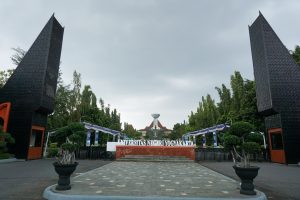Would you pay someone to write your university thesis?
For some, the answer will be an immediate “no” for a range of reasons, either moral, legal or practical. For others, it may be that such a “service” is simply unthinkable, completely unheard of, or prohibitively expensive.
In Indonesia however, a decades-old thriving business known as joki or writers-for-hire, where fellow students or recent graduates write other students’ theses, dissertations, extended essays or classroom assignments for a low fee, is back in the news.
While joki is nothing new in Indonesia, it has become a revived talking point recently following a viral video posted on X in July by the founder of the sociopolitics media platform What Is Up Indonesia, Abigail Limuria.
In the video, Limuria named a number of issues already facing the Indonesian education system, including teacher welfare, the curriculum, and teaching quality, continuing to say that the practice of joki was only adding to the existing problems.
“What makes me mindblown is that so many people don’t realize that this is wrong,” she said. “Come on guys, how can you not be aware that this is deception?”
The video has been viewed some 11 million times, and prompted discussion from students, academics and even some of the joki themselves, defending the practice and lamenting the lack of other jobs in Indonesia.
Undoubtedly, the concept of writers-for-hire comes from a confluence of factors.
One is the aforementioned saturated job market in Indonesia, which means that students and fresh graduates need to find creative ways to make money. According to Indonesia’s Central Bureau of Statistics, the unemployment rate in February 2024 stood at 4.82 percent.
Another issue is obviously overstretched and underpaid university lecturers, who often struggle with large class sizes of hundreds of students, and overwhelming administrative duties that leave them with little time to clamp down on issues like the increasing use of AI and plagiarism.
Thirdly, university students in Indonesia have become accustomed to the concept of joki, with many failing to see it as a dishonest practice, but rather a shortcut that everyone takes.
Why write your own thesis, when all your friends have hired someone else to write theirs?
Students on X, and some academics, also blamed the lack of support for students on the decision to simply pay someone else to do their work.
In particular, some highlighted the failure of many Indonesian institutions to teach students how to accurately research a topic and structure an academic thesis to reflect their findings – again being too overburdened by teaching and marking that they only have time to teach their core syllabus.
Perhaps one of the main reasons the practice flourishes is that there is really no stigma attached to it – something demonstrated by the way in which scribes-for-hire openly promote their services on social media platforms and e-commerce marketplaces.
Yet not only is joki unethical, it is also against the law – a fact confirmed by the Indonesian Ministry of Education’s X account, which replied to Limuria’s viral video.
“The academic community is prohibited from using jockeys (other people’s services) to complete assignments and scientific work because it violates ethics and the law. This is a form of plagiarism which is prohibited in Law No. 20/2003 concerning the National Education System,” the tweet said.
Yet clamping down on such a widespread practice is difficult, as universities are hardly likely to report students to the authorities for plagiarism, even if they know that it exists.
There is also scant research on the practice of joki, making it difficult to assess how widespread it actually is, and how universities could tackle something so deeply embedded in Indonesian academia.
Some lecturers on X suggested that another issue is that Indonesian academic institutions only offer the option of a thesis in order to graduate, and that this could be changed to a personal essay or another form of exam that would be more difficult for students to plagiarize.
Certainly, this is something that could be considered as a way of overturning a decades-long practice of cheating.
At a deeper level, however, academic institutions need to provide more guidance and support for students and be vigilant about the practice of joki – rather than practicing a “see-no-evil” approach that does nothing to address the issue.
If Indonesian institutions turn a blind eye to cheating before students even enter the workforce and public life, they will likely continue to learn the wrong lessons from the very academic powers that should be setting an example.

































